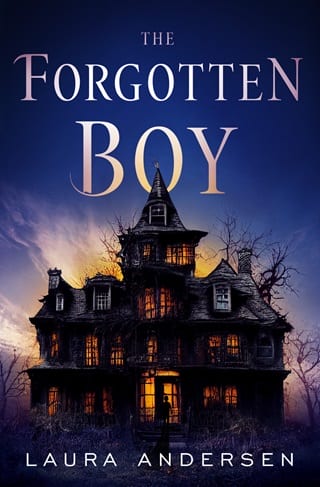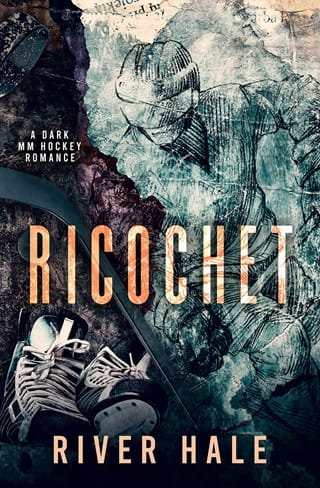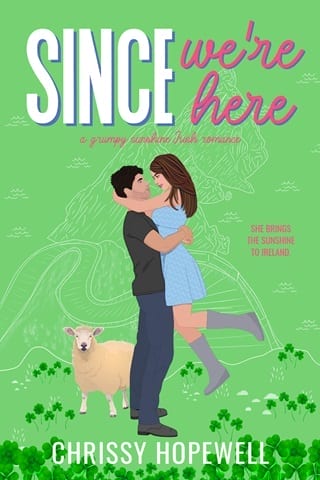Chapter Ten
CHAPTER TEN
DIANA OCTOBER 1918
The tricks began in mid-October—or at least that was when Diana began to take note. At first she thought herself simply absent-minded when she couldn't find her favorite fountain pen, only to locate it that night balanced precariously on the edge of the bathroom sink. And it wasn't so odd to misplace a file for McArdle, James in the A s instead of the M s. When she found her tea tray on her desk with the cup smashed on the floor, Diana assumed one of the boys had been looking for her and, having broken it accidentally, fled the scene.
Ink flooded across her notebook, messages that never made it to her so that she missed meetings, even a long rip in her favorite skirt—all of it, though annoying, could be explained.
But when the knocking on her door started in the middle of the night, Diana knew she had to get things under control. It wasn't that she was surprised; she'd grown up with two brothers and knew that putting ninety boys under one vast roof would entail a certain amount of high spirits and pranks. She also knew how quickly things could get out of hand in that same environment.
She brought it up in the weekly staff meeting, held every Sunday while the boys attended an evening service, presided over by a local priest in the dining hall. Present were all those who both worked and lived in Havencross: fifteen masters, Mrs. McCann the cook, Beth Willis taking notes, Diana herself, and Clarissa Somersby. Though she presided, Clarissa was not a dictatorial headmistress. She was also highly efficient: there was always a printed agenda never longer than one page handed out by Beth, and so far no meeting had lasted over an hour. Today's agenda covered the upcoming half-term holiday and the activities planned for those boys not going home, behavioral reports from the six teachers who were resident supervisors of each dormitory wing, and academic issues, which were handled by Joshua Murray as Clarissa's newly named second-in-command. Last was always Diana's report of weekly infirmary visits.
Because Diana was last, she segued straight from her medical report into the knocking on her bedroom door at night. It had happened three of the previous four nights. After asking if anyone else had been a victim, she looked expectantly around the room.
There was silence.
Diana waited for Clarissa to take control, but she looked unusually remote, even for her. So Diana mentally shrugged and queried the dormitory supervisors herself. "Have any of you noticed a boy or several boys out of bed after hours?"
It had to be asked, though she was pretty sure if they had, they'd have mentioned it earlier. Sure enough, all six denied knowledge.
Luther Weston, who taught Latin and Greek, shot a question back at Diana: "Are you quite sure you didn't …" he hesitated meaningfully. "That you weren't dreaming?"
He spoke with an arrogance that could not be learned, only inherited. Diana knew everyone there heard his real question: " Are you quite sure you didn't imagine it? "
"Once might have been dreaming. Not three times."
"It would be very difficult for any of us to have missed seeing or hearing an out-of-bound's pupil." He would have been less offensive without the forced politeness or the condescending smile. "We do know our jobs."
Little girl , he might as well have added.
Prick , she thought back. Army nursing had a way of expanding one's vocabulary.
Joshua intervened. "We all know our jobs well enough to know how very ingenious the young can be when in pursuit of mischief. This is an old house. Surely you don't pop out of bed to investigate every creak, Weston, or you'd never get any sleep. It's not hard to believe that some of the older boys have learned the quickest and quietest methods of going where they want without being noticed."
And vanishing afterward , Diana almost added. It was the part of all this she most disliked—that no matter how quickly she moved, by the time she heard the knocking and crossed the room, whoever it was had vanished out of sight in the corridor. Could they really hear her padding across the floor in her bare feet?
The alternative—that they could somehow see inside her room—she liked even less.
Beth Willis put down her pen and cleared her throat. "If you like …" she began, a little tentative since she rarely spoke in these meetings, "I can speak to my boys about any rumors going around."
"We could do that," said Weston insultingly.
Diana decided she liked him less every time he opened his mouth.
Just as she liked Beth Wills more when she retorted, "No offense, Mr. Weston, but I rather think my boys are more afraid of me than they are of you. If there are any tales being spread about mischief at night, I think I can find them out quicker than you can."
After her sphinxlike silence, at last Clarissa spoke in command. "Good, thank you, Mrs. Willis. And I think it best to set up night patrols for the next week—every hour on the hour. I'm sure you won't mind taking tonight, Mr. Weston."
"It's a waste of time," he muttered, just softly enough that Clarissa could plausibly ask, "What was that?"
There weren't enough jobs going spare in England that Weston could afford to get himself thrown out of this one. So he plastered on a neutral expression and said, "I don't mind at all."
As everyone pushed back chairs and gathered up notebooks and calendars, Joshua lingered near enough to say softly to Diana, "Can we talk privately?"
Clarissa chose this moment to say more loudly, "Stay, please, Miss Neville. I'd like a word with you."
Diana pulled a quick face at Joshua where Clarissa couldn't see, and he smiled. "Later," he mouthed, and followed the others out.
When Clarissa did not invite her to retake her seat, Diana wondered if she was about to be fired. Or at least reprimanded for causing trouble among the staff. Maybe the headmistress, too, thought Diana was imagining things.
"I assume, Miss Neville, that you do not drink in the school?"
Worse: Clarissa thought she might be drunkenly imagining things.
"I do not."
Clarissa's whole expression lightened. It was almost a smile. "You needn't look so wary, Diana. May I call you that?"
"Of course."
"How old are you?"
Didn't you even read my application? she thought. That was quite a degree of trust in her father's judgment. "I am twenty-five."
It wasn't often that Diana was reduced to such brief sentences, but standing here felt a lot like standing before the nursing matron while being examined for the slightest infraction. Diana was almost tempted to check her uniform and stand to order.
"I'm twenty-four. I've never really known those my own age," Clarissa continued, almost musing. "Being privately schooled, my only companions were my much younger siblings. I have wondered what it might be like to have someone to speak to. Someone I don't pay."
"You do pay me."
Clarissa sighed. "Yes, but a nurse is not the same as a secretary. You have your own … dominion. Your own status. And no doubt plenty of other offers of employment. You are not beholden to me in the way others might be. Would you be willing to call me Clarissa?"
Her very awkwardness proclaimed how little social interaction Clarissa Somersby had enjoyed. But there was an appealing innocence in her awkwardness. "If you'd like."
"I would."
When silence fell again—Clarissa was very good at silence—Diana furrowed her brow, trying to divine the atmosphere. "Is that all?"
Eyes downcast, fingers playing with a pen, Clarissa asked, "Have you seen anything, Diana? Anything that seems … that doesn't belong? Lights or movement?"
Diana blinked. "Are you asking me if I've seen a ghost?"
"Have you?"
It was asked with such eagerness, that Diana was almost sorry to say, "No."
"And your expression proclaims you do not expect to. You do not believe in ghosts."
Diana chose her words carefully. "If I were ever going to see the spirits of the damned, I would have seen them in France, Clarissa."
With a curious look of disappointment, Clarissa said, "Just because one is lost does not mean one is damned,"
Oh no , Diana thought guiltily. She's thinking about her little brother, lost and never found. "I didn't mean—"
Clarissa waved a hand and instantly retreated behind her headmistress-in-charge shield. "No matter. Our primary concern is always the boys themselves. Whether they are teasing you, or whether there is something more going on, we must find out and put a stop to it. The war is grinding to an end. Our students have already, most of them, lost a great deal. We must ensure that they are healthy both in body and mind."
Which was so very much the expected thing for a headmistress to say that Diana wondered if Clarissa had read it in a book. She exited the room thoughtfully, and with a sense that there was more going on with this school and its occupants than could be seen by the unwary.
That didn't mean there were ghosts running around.
She'd forgotten that Joshua had wanted to speak to her until she nearly walked into him leaning backward against the balustrade.
"Aren't you afraid of losing your balance?" she asked, for it was a long drop to the stone-flagged hall below.
"After France? Normal fears don't really apply, do they?"
Not normal fears, no. But France had hardly made her fearless. It had just sharpened and focused her fears into one, all-encompassing terror. The high whine of the shell, the roar of the explosion, the crushing weight of wood and dirt and rocks, she couldn't see, she couldn't move, she couldn't breathe …
Fortunately, that was easily dealt with: just stay out of confined spaces.
Joshua chose that moment to announce, "I've got an idea about the nighttime knockings on your door. Tunnels. And secret passages. Havencross has both."
Of course it does , she thought wearily. Of course it does .
As they could hardly throw themselves into exploring in full sight of curious schoolboys, Joshua had to be content for the present with providing descriptions and drawings. That suited Diana just fine.
To the logical question of "How do you know this?" Joshua had given an equally logical answer: "The Murrays have been entwined with this house since its beginning. My great--grandfather helped build it, and my grandmother was housekeeper here for forty years."
Diana left unasked the second and third logical questions: Wouldn't Clarissa know this? And if so, why didn't she mention it as a possible solution to the knocking?
They had retired to the infirmary, being both a private space and yet official enough that no one would think them suspiciously intimate. Something else she'd learned in France—how to function as a rare woman in a sea full of military men without drawing undue disapproval. Joshua attempted to sketch each floor of the house on its own piece of paper, but there were so many wings and asymmetries and towers that there was no way to lay it out in perfect order. He did his best, standing at the examination table with the papers scattered across it.
"See?" He grabbed the first one he'd sketched, showing the entrance hall with the school dining room on one side and a similar space on the other that he pointed to now. "The drawing room. I know there's a passageway going from there to the music room on the floor above. Gideon Somersby, who built the house, apparently liked to come and go from the ground floor without using the central staircase. He would pop out at guests without warning. Legend says it's how he discovered his first wife was cheating on him with a violinist."
"But my room isn't anywhere near there. And that's the private part of the house, anyway. I understand Clarissa keeps the outer doors locked against curious boys. Probably to keep them from playing tricks."
"It's not the only secret passage. Gideon was either truly paranoid or had a whimsical sense of fun. I know of two others, here"—he pointed at one spot and then a second on another piecemeal map—"and here."
Diana leaned in and attempted to decipher them. "That's the kitchen," she said of the first.
"That one is less exciting—simply a roofed-over passage from the scullery to the outer storerooms. This one is more pertinent."
"The staff quarters?"
He nodded. "Right at the end of the corridor. The entrance is at the back of one of the linen cupboards. It's the only one I've ever been in. It was actually Clarissa who showed me, when I was here one day with my grandmother. I was—thirteen, maybe?—so she was still a little girl. This one takes you inside the walls of the house before climbing up a story and coming out in the old servants' quarters."
Well, that answered the question of whether Clarissa knew about the passageways. And gave greater urgency to the question of why she hadn't said anything about it in the staff meeting.
"The problem is," Josh continued, "I'm pretty sure that last one is boarded up. Or at least it was, during my first year teaching. And it takes a particularly bold set of boys to traverse an entire corridor filled with schoolmasters, even in the dead of night."
"The real problem is that every one of these tunnels appears to begin and end in the main house," Diana pointed out. "Which makes sense, if Gideon Somersby was the one who wanted them. It would have taken a lot more work to incorporate hidden passages into the oldest part of Havencross, where my bedroom is—and why bother, when he had so much space to construct whatever he wanted?"
"All right, so we haven't quite sorted out how the boys are getting to you, but we will."
What if it's not the boys ? Diana didn't dare ask it aloud. She didn't know Joshua well enough for such imponderable questions. But despite her honest answers to Clarissa about ghosts, there was one detail she had omitted from her statement in the staff meeting. A tiny detail, almost inconsequential: the sound of footsteps receding down the corridor as she approached her door. And not the soft whisper of bare feet or the slap of a boy's slippers.
The distinct tapping of a woman in heels.
She'd left that part out because saying it aloud was tantamount to an accusation—against the inoffensive Mrs. McCann, or Beth Willis, or Clarissa Somersby herself. Clarissa, who had sat so silently as Diana explained the mysterious knocking. But who had also decided on nightly patrols of the boys' dorms. Which could merely be her way of deflecting attention.
But why on earth would Clarissa Somersby be sneaking around her own home in the middle of the night simply to tease Diana? And why the other tricks—the missing or moved items, the smashed teacup? There didn't seem to be any purpose to any of it, except to annoy Diana.
Or frighten her. Frighten her enough to leave? But Clarissa ran the school. If she wanted to get rid of Diana, she had only to fire her.
She realized that Joshua had stopped talking—probably some time ago, judging by his quizzical expression—and she shook her head as though waking herself up. "Sorry. Look, I don't think you're necessarily wrong that these passageways could be tempting to schoolboys if discovered. And dangerous. We should keep an eye on that."
He had tidied his various map sketches into a neat, squared-off pile that he set on her desk. "Don't worry. Weston won't be the only one patrolling tonight. I'll be on the lookout for any mischief-makers." He hesitated, then asked, "Your door does lock, doesn't it?"
"It does, but look … I didn't mean to set the cat among the pigeons like this. It's disconcerting, but hardly terrifying. As you say, the standard for horror is extremely high after France."
"You could move out of the old wing. A little closer to Mrs. Willis, perhaps."
Just the thought of leaving her private aerie with its wide-open views and silent solitude made Diana's skin crawl. Not that she wouldn't be private enough in the main house—Havencross was hardly lacking for space—but logic had little to do with it. She felt safest where she could see the farthest.
"And let whoever it is know that they've succeeded in frightening me?" she said with a laugh. "That would hardly do my authority any good. Don't worry about me. As long as the knocking is on the other side of the door, I'll be just fine."
She should really have known better than to say such things.
 Fullepub
Fullepub 



